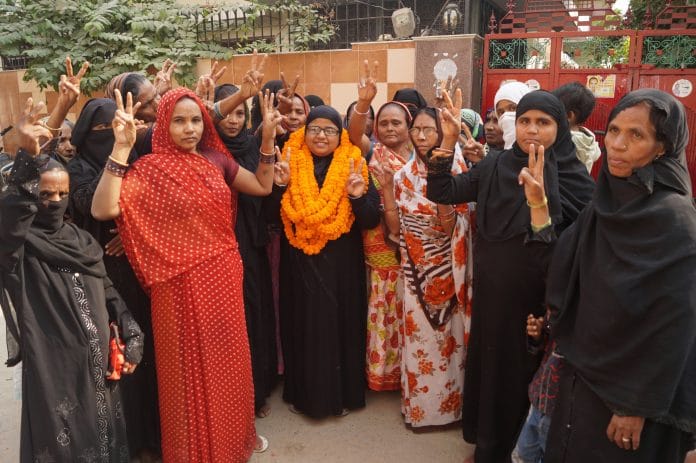The Muslim communities, like any other social group, participate in electoral politics at the constituency level.
“How many Muslims are going to contest assembly election in Gujarat this time?” “Will Muslim vote for the BJP even though the party is not interested in Muslim candidates?” “Will Rahul Gandhi’s assertion to uphold pure Hindu identity upset Muslim voters in Gujarat?”
These so-called Muslim-centric questions are evergreen but have acquired an immediacy in public discussions in the run-up to the Gujarat elections. Yet, the media-led Gujarat election narrative has relegated to the margin an analysis of Muslim political responses.
Hindutva and the political existence of Muslims
The conventional ‘Muslim politics’ of bargain and appeasement has lost its electoral value, many argue, with the rise of the BJP and its Hindutva politics. They also argue that the political class is no longer interested in debating inclusiveness and diversity because these issues do not work in interest-based competitive electoral politics. The increasing social base of the BJP, especially among Dalits and Adivasis, is presented as evidence of the grand unity that Hindutva forges. In this 80 per cent majority versus 20 per cent minority configuration, Muslim electoral responses have virtually no significance.
We are told that Hindu majoritarianism has forced the Muslims to give up identity politics, pushing them into a ‘defensive’ attitude; that they are now in search of a workable survival strategy to tackle Modi phenomena; that Muslims must embrace the BJP to create a space for themselves in such a hostile political environment.
Three Fallacies: Muslim participation versus Muslim representation
This imagination of Muslim politics is problematic for three reasons:
First: Translating population data into electoral majority-minority at the national level is a highly misleading exercise.
The Muslim communities, like any other social group, participate in the electoral politics at the constituency level responding to a number of regional and local considerations, which do not necessarily relate to the national picture.
Second: We must distinguish between Muslim participation and Muslim representation. The debate on Muslim political representation is narrowed as one about the decreasing number of Muslim MLAs and MPs. It is assumed that Muslim voters would eventually vote for a Muslim candidate in all contexts irrespective of region, caste, class, gender and party affiliation. This imaginary correlation between Muslim voters and MLAs and MPs is entirely incorrect. The shrinking presence of Muslim legislators in assemblies and parliament does not reflect Muslim political participation.
Third: The representation of certain contentious issues like triple talaq as ‘Muslim political concerns’ does not correspond to the actual anxieties of Muslim masses. Talaq is presented as the most important reason behind the marginalisation and underrepresentation of Muslim women in public life. A binary between mullahs and progressives is created without looking at the religious diversity among Muslims, the changing educational and occupational profile of Muslim women at different levels and nature of contemporary Muslim patriarchy. Presenting marriage and divorce as decisive political concerns for Muslim communities is superficial and distorted and absurd explanation.
What is Muslim politics?
Muslim politics has always been understood in negative political metaphors such as communalism, Muslims, and more recently, terrorism. Although the debates of 2000s on social exclusion and inclusion offered an official acceptability to the multilayered Muslim under-representation and backwardness in various spheres, the Muslim politics continued to be defined in a rather elitist way.
But Muslim politics is not about the claims made by Muslim leaders and religious elites who speak on their behalf. The political vocabulary they use to argue on behalf of Muslim communities always comes from competitive electoral politics
The challenge, therefore, is not merely to analyse the question of Muslim representation—declining number of MPs, MLAs. The political enthusiasm among Muslims of India for democracy, their faith in public institutions and their active participation in all forms of politics, actually constitute a kind Muslim politics, which must also to be recognised.
So, there is no harm in counting the number of Muslim candidates in recent Gujarat election for evaluating the possible Muslim presence in the forthcoming assembly. But, at the same time, we must also pay attention to the highly diversified engagements of Muslims of Gujarat with electoral politics at the constituency level for making sense of a nuanced picture of Muslim politics in the state.
Do Muslims believe in electoral democracy?
| Social Groups | Prefer Democracy | Prefer Authoritarian regime | Indifferent |
| ST | 63 | 8 | 29 |
| SC | 62 | 10 | 28 |
| Muslims | 62 | 14 | 24 |
| Upper caste | 66 | 16 | 18 |
*Figures in percentage
Source: CSDS-Lokniti report, Democracy in India: A Citizens’ Perspective (2015)
Do Muslims trust in public institutions?*
| Social Group | General Trust in public institution |
| Upper Caste | 64 |
| OBC | 64 |
| SC | 60 |
| ST | 63 |
| Muslims | 63 |
| Others | 61 |
Figures in percentage
Source: CSDS-Lokniti report, Democracy in India: A Citizens’ Perspective (2015). * “General trust” has been calculated by adding the responses to nine trust questions like trust in national government, provincial government, local government, civil services, police, courts, army, Parliament and political parties.
Do Muslim participate in politics now?
| Social Group | Persuaded others to vote | Took part in a rally | Signed a petition | Took part in a demonstration |
| Upper Caste | 18 | 22 | 30 | 22 |
| OBC | 20 | 21 | 31 | 28 |
| SC | 14 | 20 | 24 | 20 |
| ST | 15 | 16 | 26 | 19 |
| Muslims | 22 | 23 | 26 | 28 |
| Others | 9 | 13 | 19 | 15 |
*Figures in percentage and based on a series of questions.
Source: CSDS-Lokniti report, Democracy in India: A Citizens’ Perspective (2015)






